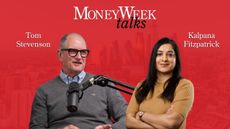Personal Finance
Coverage and analysis of the latest personal finance, tax, pensions and insurance news from the expert team at MoneyWeek.
Explore Personal Finance
-

What is Bed and ISA and how can it help shield you from tax?
Bed and ISA is a great way to protect your investment returns from the taxman. With the new tax year in April approaching, should you complete a transfer now?
By Daniel Hilton Last updated
-

ISA fund and trust picks for every type of investor – which could work for you?
Whether you’re an ISA investor seeking reliable returns, looking to add a bit more risk to your portfolio or are new to investing, MoneyWeek asked the experts for funds and investment trusts you could consider in 2026
By Laura Miller Published
-

Will mortgage rates fall this year?
The mortgage price war may be over in a blow for borrowers. Whether you're buying a home, remortgaging or you’re a buy-to-let landlord, we look at the outlook for mortgage rates this year and into 2026
By Marc Shoffman Last updated
-

What happens to your pension when you die
The way your pension is passed on to your loved ones is set for a shake-up. Here is what you need to know about who inherits your pension and why naming a beneficiary is so important
By Marc Shoffman Last updated
-

How to file a self-assessment tax return
Millions of people in the UK have to file a tax return to HMRC every year. We share our step-by-step guide.
By Marc Shoffman Last updated
-

ISAs vs savings accounts: what’s the best home for your cash savings?
Competitive savings interest rates can put savers at risk of being taxed on the interest earned. After changes to cash ISAs and the tax rate on savings interest were announced in the Autumn Budget, we compare the pros and cons of cash ISAs with other savings accounts.
By Jessica Sheldon Last updated
-

The pros and cons of smart meters: Are they any good?
Smart meters can help you track and budget your energy usage. We compare them to regular meters and consider whether it’s worth getting one.
By Daniel Hilton Last updated
-

MoneyWeek Talks: The funds to choose in 2026
Podcast Fidelity's Tom Stevenson reveals his top three funds for 2026 for your ISA or self-invested personal pension
By Kalpana Fitzpatrick Published
Podcast -

Should you add gold to your pension?
Gold price movements have been eye-catching over the past year. Should you put some gold in your pension?
By Dan McEvoy Published
